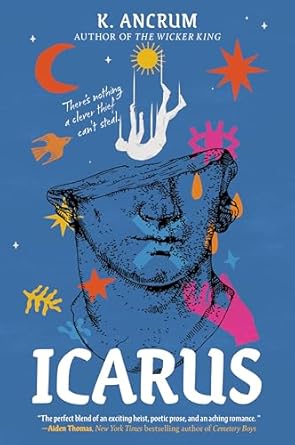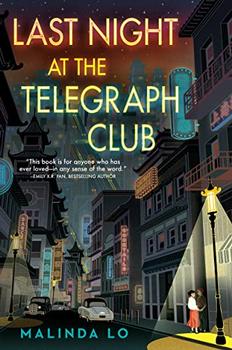Summary | Excerpt | Reviews | Beyond the book | Read-Alikes | Genres & Themes | Author Bio

The titular protagonist of K. Ancrum's young adult novel Icarus lives a double life that mixes the mundane and inexplicable. By day, he is like any other high school senior, managing his classes, navigating student cliques, and preparing for the frightening and exhilarating independence lurking just beyond graduation. By night, his life dips into the bizarre and even outlandish — Icarus is a thief at the behest of his art restorationist father, Angus, breaking into nearby Mr. Black's mansion to replace genuine artwork with Angus's forgeries. Neither Angus nor Icarus are motivated by money in these robberies; Angus is more than successful with his restorations, not infrequently commissioned by world-famous museums. The novel reveals in painstaking bits and pieces the vengeful hatred undergirding Angus's criminal activities, into which he has dragged Icarus.
Because of the long hours and dangerous illegality of his work, Icarus keeps others at arm's length. He is strategic in forming acquaintanceships that end with each class period and do not extend after school hours. While others his age spend time with friends in the evening, Icarus falls into a surreal, almost unbelievable underworld. But his isolation ends when, during one of his routine break-ins, navigating the expensive-art-laden, gothic dimensions of the mansion, he is caught by Mr. Black's entrapped son, Helios, who only asks for company and friendship. An unlikely intimacy forms between these two young adults as they find warmth with each other away from their broken family backgrounds — a sense of belonging that naturally progresses into star-crossed romance.
Icarus is an ode to intimacy. Physicality is charged with emotional intensity even when Helios first catches Icarus red-handed. Ancrum's writing is unafraid to get up close and personal — as Helios "caught [Icarus's] arm quick and pushed him bodily up against the bookshelf," Icarus realizes that he "had never had someone this close pressed along every inch of him, and it was more than he could take. His eyes rolled back as the heat of a palm squeezed his forearm. Strong thighs bracketed his, preventing his escape. Icarus's knees felt like they were about to fail him." Acknowledged here and throughout the book is the complexity and often contradictory duality of this intimacy. Latent violence as well as heated pleasure accompany fears of exposure, vulnerability, and retribution — "Icarus was unmoored: naked and shaking in the circle of his own light," and yet, he has accessed long withheld warmth that beckons with the faint promise of openness and connectivity.
The dire effects of touch starvation and emotional neglect are also excavated in Icarus's thematic interrogation of fatherhood. Icarus dwells on how, other than their complicity in art forgery and theft from Mr. Black's mansion, he and Angus live separate lives, coming and going as they please with minimal notice to each other, while Icarus assumes sole responsibility for household chores. Their relationship is often business-like or transactional — at one point, Icarus buys a bottle of wine off Angus, never considering that Angus could offer it to him, father to son, as a freely given gift. Icarus likens his relationship with his father to one between a master and apprentice, a teacher expressing responsibility for a pupil without the warmth and compassion of parental care.
Small moments of tenderness do peek through — when Angus witnesses Icarus successfully removing a crayon stain from a Monet, he smiles and expresses pride. Yet, these exist alongside moments of brutal, paternalistic discipline. Routinely, Angus has Icarus pray on his knees and presents him with a false choice: he can either confess his sins or get hit with a switch, between which Icarus, of course, chooses confession. Thus, Icarus never romanticizes Angus's stoicism, showing the profound effects it has on his son's development into adulthood while still acknowledging an unbreakable bond between father and son, despite silence, frustration, loneliness, and anger.
Built on short sentences, lines, and paragraphs, Icarus is plainspoken but lyrical, delving into the main character's psyche from a third-person perspective. Each chapter generally lasts no more than four pages. This economy, rather than restricting the novel's exploration of interiority, bolsters it: in addition to illustrating Icarus's isolation as his double life pares down interpersonal communications and emotional connections, Ancrum's style saddles the simplest gestures and routines with meaning. Concluding one scene of forced religious confession are two short lines: "Angus took his hand back. When Icarus finally had the strength to pull his face up from the wood, he was alone." Their compactness invites a closer, more intimate and expanded interpretation of ostensibly straightforward sentences — Angus's retracted skinship, with Icarus ultimately left "alone" to fend for himself in the face of emotional vulnerability, becomes representative of the gaping disconnect that is the basis of their relationship throughout the story.
Indeed, the novel insists all its characters possess interiorities and hidden depths. Though its title implies the all-consuming importance of the titular protagonist and his motivations, desires, and coming of age, Ancrum's novel devotes ample space to the humanity of his daytime acquaintances. None of the characters fit neatly into high school stereotypes, despite Icarus's attempts to compartmentalize them with depthless labels: popular kid, jock, nerd, and loner. While Icarus is the main focus, the stories and fates of an entire surrounding cast – Celestina, Luca, Julian, Sorrel, and Aspen – are not peripheral. Numerous chapters are devoted to their family lives and personal quests, though not all of them are followed through with satisfying closure. In Ancrum's character-driven Icarus, flying too close to the warmth of the sun, to the unique light offered by each person, is not a matter of gross overreach but is, in fact, a necessity, a basic condition of humanity and interconnectedness, even at the risk of violent crash and burn.
![]() This review was originally published in The BookBrowse Review in May 2024, and has been updated for the
April 2025 edition.
Click here to go to this issue.
This review was originally published in The BookBrowse Review in May 2024, and has been updated for the
April 2025 edition.
Click here to go to this issue.

If you liked Icarus, try these:

The Corruption of Hollis Brown
by K. Ancrum
Published 2025
From acclaimed author K. Ancrum comes a queer romantic thriller in which the lives of Hollis, a boy in search of meaning, and Walt, a spirit with unfinished business, collide when Walt takes possession of Hollis's body...and maybe his heart. For fans of Adam Silvera and Aiden Thomas!

Last Night at the Telegraph Club
by Malinda Lo
Published 2021
Acclaimed author of Ash Malinda Lo returns with her most personal and ambitious novel yet, a gripping story of love and duty set in San Francisco's Chinatown during the 1950s.
Your guide toexceptional books
BookBrowse seeks out and recommends the best in contemporary fiction and nonfiction—books that not only engage and entertain but also deepen our understanding of ourselves and the world around us.